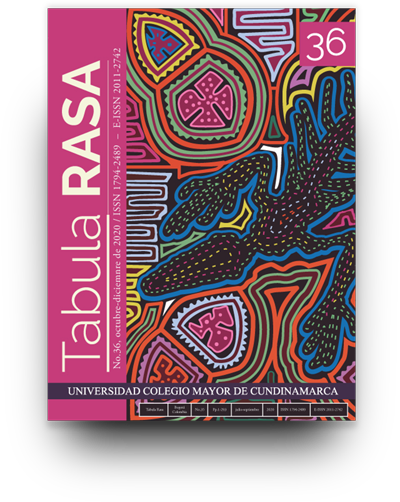The World-System Beyond 1492: Modernity, Christianity, and Coloniality: An Approach to the Decolonial Historiographic Turn
El sistema-mundo más allá de 1492: modernidad, cristiandad y colonialidad: aproximación al giro historiográfico decolonial
Show authors biography
“The world-system beyond 1492: Modernity, christianity, and coloniality” proposes to value the shortcomings of decolonial historiography stemming from the legacy received by the research program developed by I. Wallerstein. It intends to address open issues emerging from the mapping focused in the Northwestern section of the Mediterranean See. This approach to the Decolonial Historiographic Turn, I will assess how the world- systems analysis is addressed in Walter Mignolo, Enrique Dussel, and Ramón Grosfoguel’s works, in order tho show how the challenges, omissions, and/or attempts to solve the debates on the world-system notion have derived in questions that leave the former decolonial turn overcome by Euro-centrism.
Article visits 274 | PDF visits 227
Downloads
- Abu-Lughod, J. (1989). Before European Hegemony. The World System A.D. 1250-1350. New York: Oxford University Press.
- Bernal, M. (2003). Black Athena, The Afroasiatic Roots of Classical Civilization: The Fabrication of Ancient Greece 1785-1985. Vol I. New Brunswick: Rutgers University Press.
- Blaut, J.M. (1993). The Colonizer`s model of the world: Geographical Diffusionism and Eurocentric History. New York/London: The Guilford Press.
- Castro-Gómez, S. (2005). La hybris del punto cero: ciencia, raza e ilustración en la Nueva Granada (1750-1816). Bogotá: Pontificia Universidad Javeriana.
- Childe, V. G. (1988). Evolución social. México: Plaza y Valdés Editores.
- Dussel, E. (2014). 16 tesis de economía política: interpretación filosófica. México: Siglo XXI Editores.
- Dussel, E. (2007). Política de la liberación: historia mundial y crítica. Madrid: Editorial Trotta.
- Dussel, E. (2006). Ética de la liberación en la edad de la globalización y de la exclusión. Madrid: Editorial Trotta.
- Dussel, E. & Fornazzari, A. (2002). World-System and “Trans”-Modernity. Neplanta: views from the South, 3(2), 221-244. https://muse.jhu.edu/article/23955
- Dussel, E. (1977). Filosofía de la liberación. Bogotá: Ediciones Nueva América.
- Fanon, F. (2009). Piel negra, máscaras blancas, Madrid: Akal.
- Frank, A. G. (2015). ReOrienting The 19th Century: Global Economy in Continuing Asian Age. Boulder: Paradigm Publisher.
- Frank, A. G. (1998). ReOrient: Global Economy in the Asian Age. Berkeley: University of California Press.
- Frank, A. G. & Gills, B. K. (Eds.). (1996). The World System, Five hundred years or five thousand? New York: Routledge.
- Frankopan, P. (2016). El corazón del mundo, Una nueva historia universal. Barcelona: Editorial Crítica.
- González Ferrín, E. (2006). Historia general de Al-Ándalus: Europa entre Oriente y Occidente. Córdoba: Editorial Almuzara.
- Goody, J. (2011). El robo de la historia. Madrid: Ediciones Akal.
- Grosfoguel, R. (2013). Racismo/sexismo epistémico, universidades occidentalizadas y los cuatro genocidios/epistemicidios del largo siglo XVI. Tabula Rasa, 19, 31-58. https://doi.org/10.25058/20112742.153
- Grosfoguel, R. (2007). Descolonizando los universalismos occidentales: el pluriversalismo transmoderno decolonial desde Aimé Césaire hasta los zapatistas. En: S. Castro-Gómez & R. Grosfoguel. El giro Decolonial: reflexiones para una diversidad epistémico más allá del capitalismo global, (pp. 63-77). Bogotá: Siglo del Hombre Editores.
- Heng, G. (2018). The Invention of Race in the European Middle Ages. Cambridge: Cambridge University Press.
- Hobson, J. (2004). Los orígenes orientales de la civilización de Occidente. Barcelona: Editorial Crítica.
- Karatani, K. (2014). The structure of world history. From modes of production to modes of exchange. Durham: Duke University Press.
- Karatani, K. (2008). Beyond Capital-Nation-State. A Journal of Economics, Culture & Society, 20(4), Rethinking Marxism:569-595. https://doi.org/10.1080/08935690802299447
- Mignolo, W. (2011). The Darker Side of Western Modernity. Global futures, Decolonial Options. Durham: Duke University Press.
- Mignolo, W (2009). Desprendimiento, la retórica de la modernidad y la lógica de la colonialidad. En: R. Grosfoguel & J. Romero Losacco (Comps.). Pensar descolonial. Caracas: Fondo Editorial La Urbana.
- Mignolo, W. (2000a). La colonialidad a lo largo y a lo ancho: el hemisferio occidental en el horizonte colonial de la modernidad. En: E. Lander (Ed.). La colonialidad del saber: eurocentrismo y ciencias sociales perspectivas latinoamericanas. Caracas: Faces – UCV.
- Mignolo, W. (2000b). The Darker side of the renaissance: Literacy, Territoriality, and colonization. Ann Arbor: University of Michigan.
- Pomeranz, K. (2000). The Great Divergence: China, Europe, and the making of the modern world economy. New Jersey: Princeton University Press.
- Prado, A. (2018). Genealogía del monoteísmo, la religión como dispositivo colonial. Madrid: Akal.
- Quijano, A. (2009). Colonialidad del poder y clasificación social. En: R. Grosfoguel & J. Romero Losacco (Comps.). Pensar decolonial. Caracas: Fondo Editorial La Urbana.
- Quijano, A. (1992). Colonialidad y modernidad/racionalidad. Perú Indígena, 13(29), 11-20.
- Raju, C.K. (2012). Euclid and Jesus. How and why the church changed mathematics and Christianity across two religions war. Penang: Multiversity and Citizens International.
- Romero Losacco J. (2017). El fetichismo del Capital-Estado-Nación: de la transcrítica a la transmodernidad. Transmodernity: Journal of Peripheral Cultural Production of the Luso-Hispanic World, 7(2). https://escholarship.org/uc/item/0zw9862f
- Waines, D. (2010). The Odyssey of Ibn Battuta: Uncommon Tales of a Medieval Adventurer. New York: I.B. Tauris.
- Wallerstein, I (2011). The Modern World-System IV. Centrist Liberalism Triumphant, 1789-1914. Berkeley: University of California Press.
- Wallerstein, I (2006a). Abrir las ciencias sociales. México: Siglo XXI editores.
- Wallerstein, I (2006b). Capitalismo histórico. México: Siglo XXI editores.
- Wallerstein, I (2005). El moderno sistema mundial: agricultura capitalista y los orígenes de la economía-mundo europea en el siglo XVI. México: Siglo XXI editores.
- Wallerstein, I (2004). El moderno sistema mundial: la segunda era de gran expansión de la economía-mundo capitalista, 1730-1850. México: Siglo XXI editores.
- Wallerstein, I, (2000a). Oliver C. Cox as World-Systems Analyst. Research in Race and Ethnic Relations, 11, 173-183.
- Wallerstein, I. (1999) Impensar las ciencias sociales, los límites de los paradigmas decimonónicos. México, Siglo XXI editores.
- Wallerstein, I. (1990). World-Systems Analysis, the Second Phase. Review (Fernand Braudel Center), 13(2), 287-293. https://www.jstor.org/stable/40241154?seq=1








